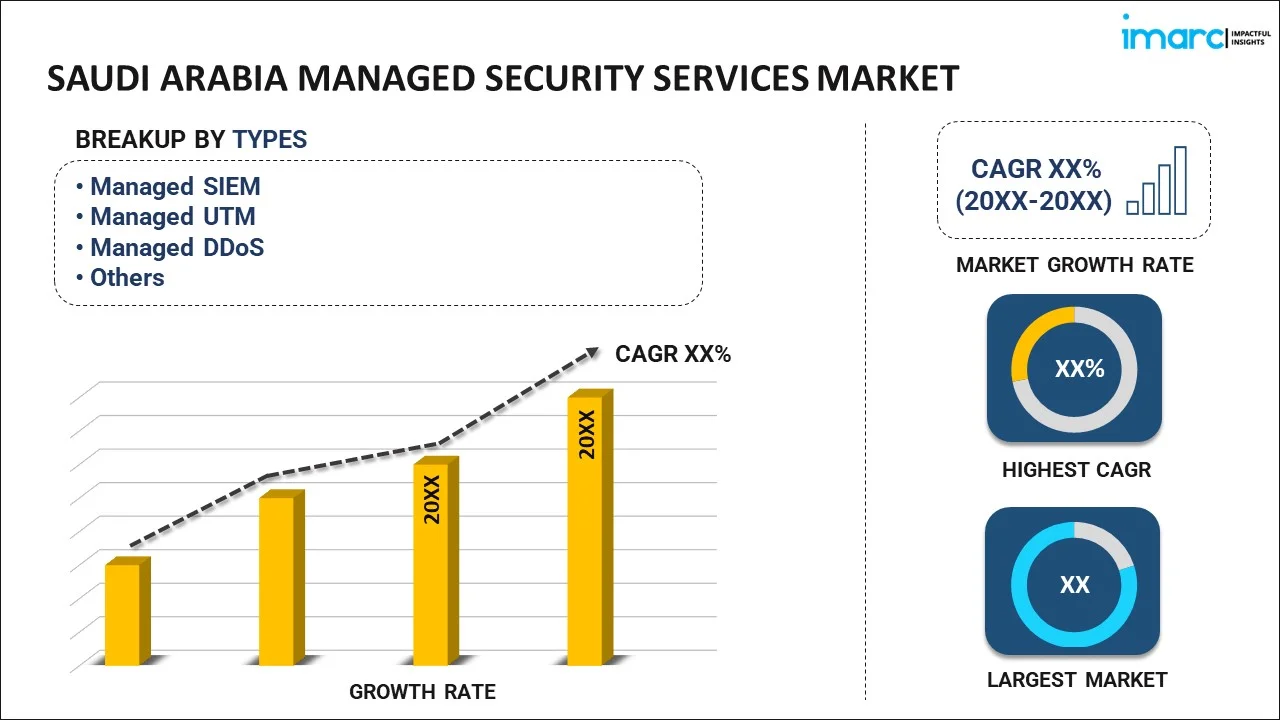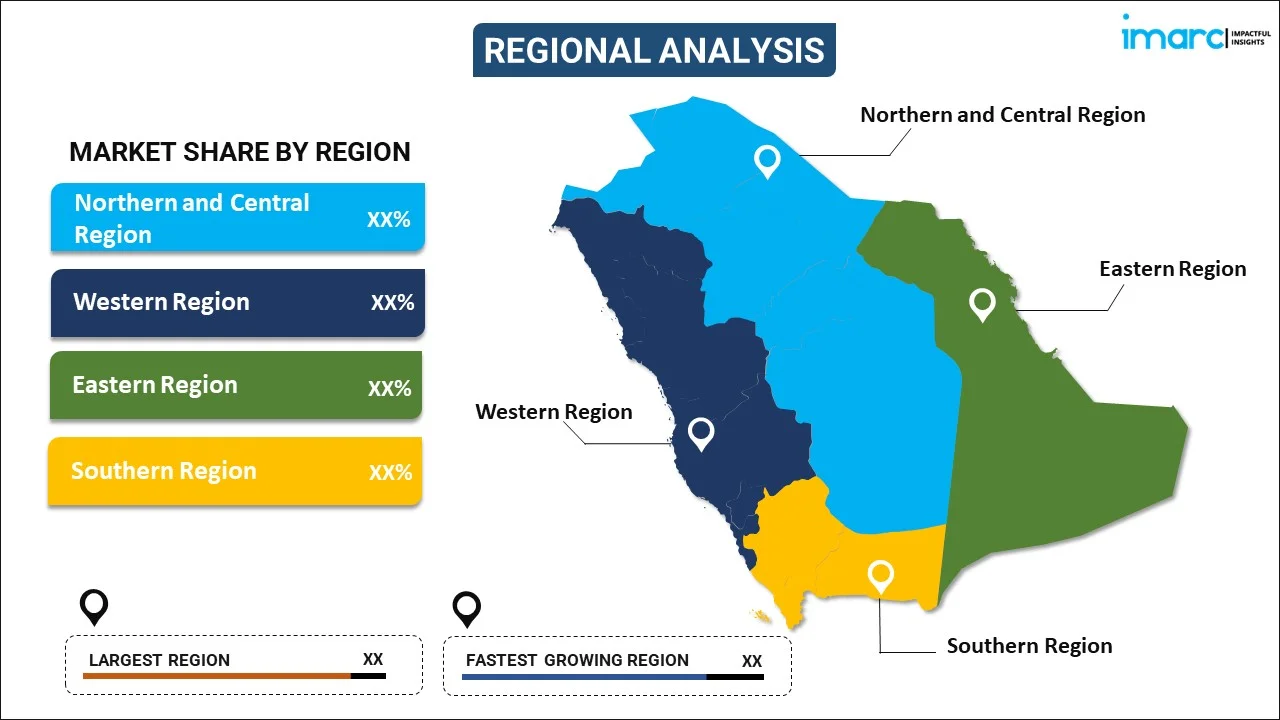
Saudi Arabia Managed Security Services Market Report by Type (Managed SIEM, Managed UTM, Managed DDoS, Managed XDR, Managed IAM, Managed Risk and Compliance, and Others), Deployment Mode (On-premises, Cloud-based), Enterprises Size (Small and Medium-sized Enterprises, Large Enterprises), Vertical (BFSI, Healthcare, Manufacturing, IT and Telecom, Retail, Defense/Government, and Others), and Region 2026-2034
Market Overview:
Saudi Arabia managed security services market size reached USD 485.1 Million in 2025. Looking forward, IMARC Group expects the market to reach USD 1,252.5 Million by 2034, exhibiting a growth rate (CAGR) of 11.12% during 2026-2034. The increasing complexity of IT infrastructures, including the adoption of cloud services, IoT devices, and mobile technologies, which makes it challenging for organizations to manage security in-house, is driving the market.
|
Report Attribute
|
Key Statistics
|
|---|---|
|
Base Year
|
2025
|
|
Forecast Years
|
2026-2034
|
|
Historical Years
|
2020-2025
|
|
Market Size in 2025
|
USD 485.1 Million |
|
Market Forecast in 2034
|
USD 1,252.5 Million |
| Market Growth Rate 2026-2034 | 11.12% |
Managed security services (MSS) refer to comprehensive outsourced solutions that help organizations enhance their cybersecurity posture. MSS providers deliver a range of services, including threat detection, incident response, and vulnerability management. These services are often delivered remotely, allowing businesses to leverage the expertise of cybersecurity professionals without the need for in-house resources. MSS providers use advanced technologies such as Security Information and Event Management (SIEM) systems to monitor network activities, analyze logs, and identify potential security incidents. They also offer proactive measures like firewall management, antivirus updates, and security patching to mitigate vulnerabilities. By outsourcing security responsibilities to MSS providers, organizations can benefit from 24/7 monitoring, rapid response to emerging threats, and access to the latest cybersecurity tools and techniques. This approach enables businesses to focus on their core activities while ensuring a robust and continuously evolving defense against cyber threats.
Saudi Arabia Managed Security Services Market Trends:
The burgeoning demand for managed security services is propelled by a confluence of factors, as the contemporary threat landscape undergoes constant evolution. Primarily, the escalating frequency and sophistication of cyberattacks have catapulted organizations into a perpetual struggle to safeguard their digital assets. In response to this, companies are increasingly turning to MSS providers to fortify their defenses and stay ahead of the ever-adapting threat vectors. Furthermore, the regional digital transformation has expanded the attack surface, making it imperative for businesses to outsource their security needs to specialized services. This trend is driven by the need for seamless integration of security measures across diverse digital platforms. Additionally, regulatory compliance mandates are tightening regionally, compelling organizations to adopt robust security postures. MSS providers offer the expertise required to navigate the intricate web of compliance requirements, ensuring that businesses adhere to standards and regulations. Moreover, the shortage of skilled cybersecurity professionals intensifies the reliance on MSS providers, offering a cost-effective and efficient alternative to in-house security teams. In essence, the dynamic interplay of evolving cyber threats, digital expansion, regulatory pressures, and talent scarcity acts as a powerful catalyst, propelling the MSS market forward in Saudi Arabia.
Saudi Arabia Managed Security Services Market Segmentation:
IMARC Group provides an analysis of the key trends in each segment of the market, along with forecasts at the country level for 2026-2034. Our report has categorized the market based on type, deployment mode, enterprises size, and vertical.
Type Insights:

To get more information on this market, Request Sample
- Managed SIEM
- Managed UTM
- Managed DDoS
- Managed XDR
- Managed IAM
- Managed Risk and Compliance
- Others
The report has provided a detailed breakup and analysis of the market based on the type. This includes managed SIEM, managed UTM, managed DDoS, managed XDR, managed IAM, managed risk and compliance, and others.
Deployment Mode Insights:
- On-premises
- Cloud-based
A detailed breakup and analysis of the market based on the deployment mode have also been provided in the report. This includes on-premises and cloud-based.
Enterprises Size Insights:
- Small and Medium-sized Enterprises
- Large Enterprises
The report has provided a detailed breakup and analysis of the market based on the enterprises size. This includes small and medium-sized enterprises and large enterprises.
Vertical Insights:
- BFSI
- Healthcare
- Manufacturing
- IT and Telecom
- Retail
- Defense/Government
- Others
A detailed breakup and analysis of the market based on the vertical have also been provided in the report. This includes BFSI, healthcare, manufacturing, IT and telecom, retail, defense/government, and others.
Regional Insights:

- Northern and Central Region
- Western Region
- Eastern Region
- Southern Region
The report has also provided a comprehensive analysis of all the major regional markets, which include Northern and Central Region, Western Region, Eastern Region, and Southern Region.
Competitive Landscape:
The market research report has also provided a comprehensive analysis of the competitive landscape. Competitive analysis such as market structure, key player positioning, top winning strategies, competitive dashboard, and company evaluation quadrant has been covered in the report. Also, detailed profiles of all major companies have been provided.
Saudi Arabia Managed Security Services Market Report Coverage:
| Report Features | Details |
|---|---|
| Base Year of the Analysis | 2025 |
| Historical Period | 2020-2025 |
| Forecast Period | 2026-2034 |
| Units | Million USD |
| Scope of the Report | Exploration of Historical and Forecast Trends, Industry Catalysts and Challenges, Segment-Wise Historical and Predictive Market Assessment:
|
| Types Covered | Managed SIEM, Managed UTM, Managed DDoS, Managed XDR, Managed IAM, Managed Risk and Compliance, Others |
| Deployment Modes Covered | On-premises, Cloud-based |
| Enterprises Sizes Covered | Small and Medium-sized Enterprises, Large Enterprises |
| Verticals Covered | BFSI, Healthcare, Manufacturing, IT and Telecom, Retail, Defense/Government, Others |
| Regions Covered | Northern and Central Region, Western Region, Eastern Region, Southern Region |
| Customization Scope | 10% Free Customization |
| Post-Sale Analyst Support | 10-12 Weeks |
| Delivery Format | PDF and Excel through Email (We can also provide the editable version of the report in PPT/Word format on special request) |
Key Questions Answered in This Report:
- How has the Saudi Arabia managed security services market performed so far and how will it perform in the coming years?
- What is the breakup of the Saudi Arabia managed security services market on the basis of type?
- What is the breakup of the Saudi Arabia managed security services market on the basis of deployment mode?
- What is the breakup of the Saudi Arabia managed security services market on the basis of enterprises size?
- What is the breakup of the Saudi Arabia managed security services market on the basis of vertical?
- What are the various stages in the value chain of the Saudi Arabia managed security services market?
- What are the key driving factors and challenges in the Saudi Arabia managed security services?
- What is the structure of the Saudi Arabia managed security services market and who are the key players?
- What is the degree of competition in the Saudi Arabia managed security services market?
Key Benefits for Stakeholders:
- IMARC’s industry report offers a comprehensive quantitative analysis of various market segments, historical and current market trends, market forecasts, and dynamics of the Saudi Arabia managed security services market from 2020-2034.
- The research report provides the latest information on the market drivers, challenges, and opportunities in the Saudi Arabia managed security services market.
- Porter's five forces analysis assist stakeholders in assessing the impact of new entrants, competitive rivalry, supplier power, buyer power, and the threat of substitution. It helps stakeholders to analyze the level of competition within the Saudi Arabia managed security services industry and its attractiveness.
- Competitive landscape allows stakeholders to understand their competitive environment and provides an insight into the current positions of key players in the market.
Need more help?
- Speak to our experienced analysts for insights on the current market scenarios.
- Include additional segments and countries to customize the report as per your requirement.
- Gain an unparalleled competitive advantage in your domain by understanding how to utilize the report and positively impacting your operations and revenue.
- For further assistance, please connect with our analysts.
 Request Customization
Request Customization
 Speak to an Analyst
Speak to an Analyst
 Request Brochure
Request Brochure
 Inquire Before Buying
Inquire Before Buying




.webp)




.webp)












